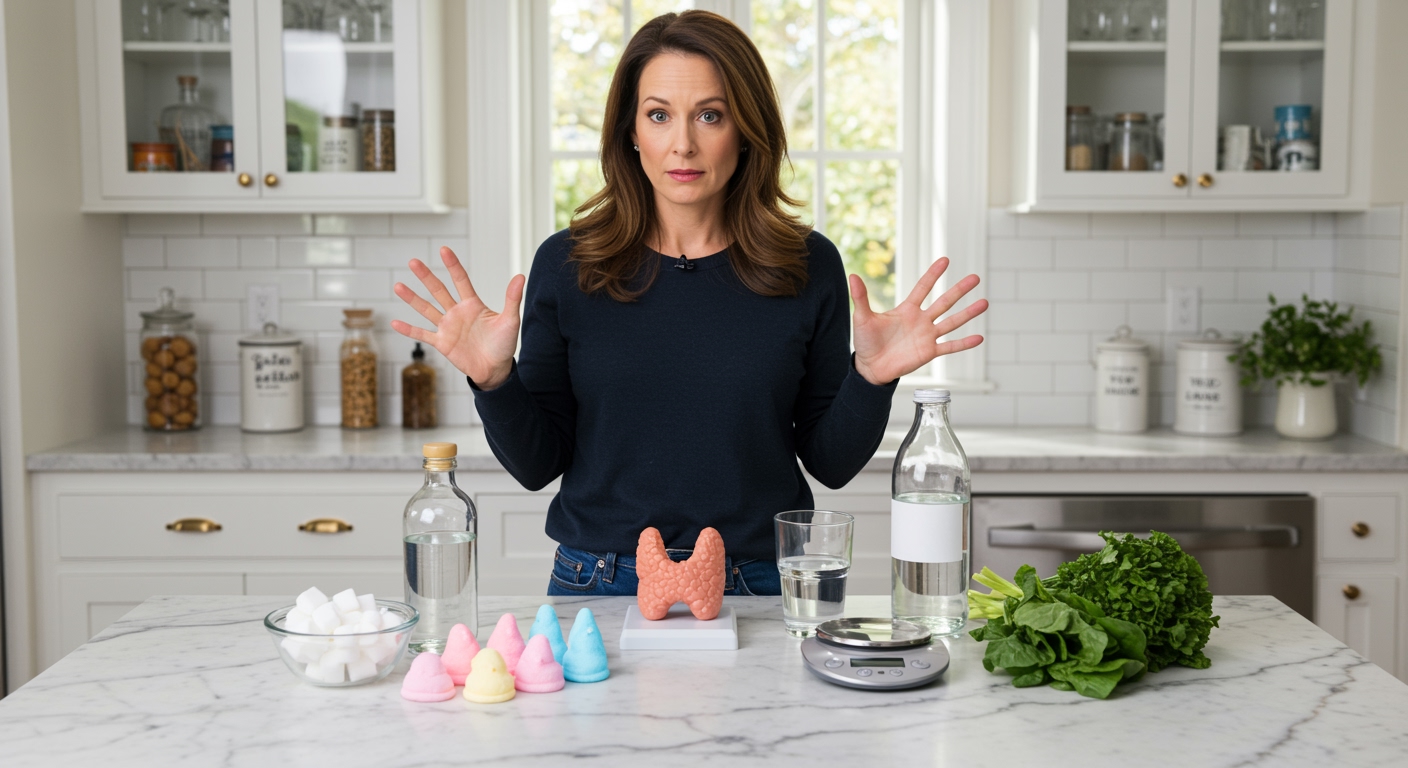✪ Key Takeaway: Peeps are not always bad for hypothyroidism, but their high sugar content and artificial ingredients make them a poor choice for regular consumption.
Introduction
You walk down the candy aisle during Easter season and those colorful marshmallow chicks catch your eye.
But then you remember your hypothyroidism diagnosis and wonder if these sweet treats will make your condition worse.
Hi, I’m Abdur, your nutrition coach and today I’m going to explain exactly how Peeps affect your thyroid function and whether you need to avoid them completely.
What Exactly Are Peeps Made Of?
Peeps are marshmallow candies made primarily from sugar, corn syrup, gelatin, and artificial colors.
A single serving of five Peeps contains about 28 grams of sugar and 140 calories with virtually no nutritional value.
The ingredient list includes artificial dyes like Yellow 5, Red 3, and Blue 1 which have raised health concerns over the years.
Some reports suggest these candies contain titanium dioxide, a chemical that has been linked to potential health risks in animal studies.
The gelatin comes from animal collagen, which provides the chewy texture but offers no beneficial nutrients for thyroid health.
✪ Fact: Just Born Quality Confections produces more than 5.5 million Peeps every single day during peak season.
How Does Sugar Affect Your Thyroid Function?
Sugar does not directly damage your thyroid gland or stop it from producing hormones.
However, excessive sugar intake creates a cascade of metabolic problems that indirectly worsen hypothyroidism symptoms.
When you eat high amounts of sugar, your body experiences rapid blood glucose spikes followed by crashes.
These fluctuations increase inflammation throughout your body, which can interfere with the conversion of T4 to T3, the active thyroid hormone your cells actually use.
High sugar consumption also promotes insulin resistance, a condition where your cells stop responding properly to insulin.
Insulin resistance is strongly connected to thyroid dysfunction and makes it harder to manage hypothyroidism symptoms like weight gain and fatigue.
Sugar feeds harmful gut bacteria and creates an imbalance in your microbiome, which plays a crucial role in thyroid hormone metabolism.
✪ Note: About 20 percent of thyroid hormone conversion happens in your gut, making digestive health critical for thyroid function.
Do Artificial Ingredients In Peeps Harm Your Thyroid?
The artificial colors in Peeps have been studied for various health effects, but direct thyroid damage is not well established.
Red 3, one of the dyes used in Peeps, was banned from cosmetics in 1990 due to concerns about cancer risk in animal studies.
However, this dye remains approved for use in food products, creating confusion about its actual safety.
Some artificial colors have been linked to increased inflammation and immune system activation in sensitive individuals.
Since many cases of hypothyroidism result from autoimmune thyroid disease like Hashimoto’s, anything that triggers immune responses deserves attention.
The titanium dioxide found in some Peeps varieties has raised concerns because it may cause inflammation and oxidative stress.
While research on humans is limited, people with thyroid conditions should minimize exposure to potentially inflammatory compounds whenever possible.
✪ Pro Tip: Always check ingredient lists on candy packages because formulations can change and some varieties contain different additives than others.
Can You Ever Eat Peeps With Hypothyroidism?
The answer depends on your individual health status, how well controlled your thyroid condition is, and your overall diet quality.
If you eat a nutrient-dense diet most of the time and your thyroid levels are stable on medication, an occasional Peep will not destroy your health.
The problem arises when treats like Peeps become regular additions to your diet rather than rare indulgences.
Your thyroid needs specific nutrients like selenium, zinc, iron, and iodine to function properly, and empty-calorie foods displace nutrient-rich options.
If you struggle with uncontrolled blood sugar, significant weight gain, or active autoimmune flares, avoiding Peeps makes sense.
Think of your diet as a bank account where you want to make mostly healthy deposits with occasional small withdrawals for enjoyment.
✪ Pro Tip: If you choose to eat Peeps, pair them with protein and healthy fats to slow sugar absorption and minimize blood glucose spikes.
What Are Better Alternatives To Peeps?
You do not need to give up all treats when you have hypothyroidism, but choosing smarter options protects your health.
Dark chocolate with at least 70 percent cocoa provides antioxidants and contains less sugar than marshmallow candies.
Fresh fruit with a small amount of nut butter gives you natural sweetness plus fiber, vitamins, and healthy fats.
Homemade treats made with natural sweeteners like dates or maple syrup let you control ingredients and avoid artificial additives.
Greek yogurt with berries and a drizzle of honey satisfies sweet cravings while providing protein and probiotics that support gut health.
If you love marshmallows specifically, look for brands made with natural ingredients and no artificial colors or titanium dioxide.
The goal is not perfection but rather making conscious choices that support your thyroid function and overall wellbeing most of the time.
✪ Note: Reading ingredient labels becomes second nature once you start practicing, and this habit protects your health for life.
The Bottom Line
Peeps are not poison for people with hypothyroidism, but they offer nothing beneficial and contain ingredients that can worsen inflammation and metabolic problems.
Health over convenience means choosing foods that nourish your body instead of just satisfying momentary cravings.
I would love to hear your thoughts on managing treats with hypothyroidism, so please share your experiences or questions in the comments below.
References
At NutritionCrown, we use quality and credible sources to ensure our content is accurate and trustworthy. Below are the sources referenced in writing this article:
- National Institute of Diabetes and Digestive and Kidney Diseases: Hypothyroidism (Underactive Thyroid)
- NP Thyroid: Sugar’s Connection to Hypothyroid Symptoms
- Business Insider Africa: A Report Says Peeps Contain a Chemical Linked to Cancer
- Cleveland Clinic: Hypothyroidism
- Paloma Health: Foods to Avoid with Hypothyroidism





